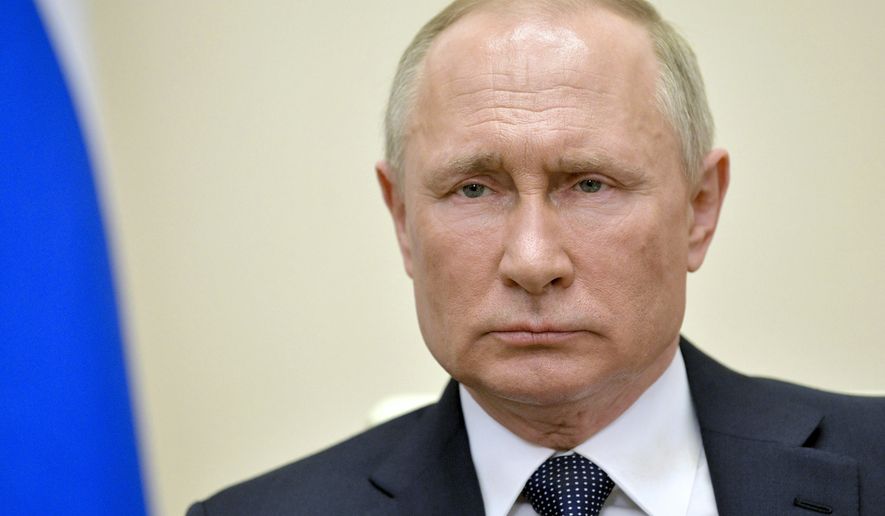Russian officials insisted Monday they are “very close” to finalizing a deal with Saudi Arabia to cut oil production and halt a price war that’s shaken global markets and driven energy prices to historic lows, even as analysts still warn that the sector could slump further as the coronavirus outbreak crushes demand.
With U.S. energy leaders resisting the idea of cutting domestic production and warning President Trump against extreme measures such as tariffs on foreign fuel imports, all eyes have turned to Russia and Saudi Arabia, two of the world’s largest oil producers, to cut the flow of oil into overstocked markets.
A planned Monday summit of the world top oil producers, which Mr. Trump hailed on Twitter last week, has been pushed back to Thursday amid rising uncertainty that Riyadh and Moscow were ready to cut a deal.
Oil demand already has plummeted by roughly 20 million barrels per day as the coronavirus pandemic has frozen economic activity around the world. Prices have dropped about 60% since the beginning of the year, and there’s growing fear that continued falling prices could deepen the current economic meltdown.
The White House over the weekend put its hopes on the widely anticipated meeting Monday between Russia and the Saudi-led OPEC cartel, where investors hoped a deal could be reached to temporarily slow production and stabilize prices. Even with the four-day delay, top Russian officials expressed optimism that they’d soon cut a deal with Riyadh to cut production and raise prices.
The U.S. energy industry has been devastated by the falling oil prices, sparking economic distress in states key to Mr. Trump’s November reelection hopes.
CEO of the Russian Direct Investment Fund Kirill Dmitriev told CNBC on Monday that “the whole market understands that this deal is important and it will bring … so much important stability to the market, and we are very close.”
Mr. Trump last week said that he’d helped to broker that deal, speculating that it could bring down oil production by as much as 15 million barrels per day — although he provided no evidence such a cut was being discussed.
The importance of the elusive agreement came into even sharper focus Monday as energy market analysts the global oil glut could increase to unprecedented levels if the top suppliers failed to act.
“While it is unlikely that nominal storage capacity will be breached, it is possible that the sheer scale of the oversupply will overwhelm global logistics chains, plunging Brent into single-digit lows,” specialists with Fitch Solutions wrote in a Monday analysis.
The steep decline in oil prices seen last month had begun to show signs of stabilization amid hopes of a Russia-Saudi Arabia deal. But prices dipped again Monday, with the benchmark Brent Crude Oil dipping 2.4% to about $33 per barrel.
Faced with plunging prices, the president last Saturday raised the specter of tariffs on oil imports to protect U.S. energy companies and stop the domestic market from being flooded with cheap foreign oil.
“If I have to do tariffs on oil coming from outside, or if I have to do something to protect thousands or tens of thousands of energy workers and our great companies that produce all these jobs, I’ll do whatever I have to do,” Mr. Trump said Saturday, one day after meeting with top oil industry executives at the White House.
But U.S. oil-and-gas sector leaders have warned that tariffs on foreign imports can raise the cost of imported production materials and drive up the price of doing business at home. Furthermore, American companies are standing firm against the idea that the U.S. should slash its own oil production to match cuts from Russia and Saudi Arabia — an idea some officials in Moscow reportedly are pushing for.
“Taking more U.S. oil offline isn’t the answer,” Mark Green, a blogger for the American Petroleum Institute, wrote in a piece Monday. “Again, the United States already has made market-driven production cuts.”
But other analysts argue that by refusing to cut its own production while demanding other countries do so, the U.S. is opening itself up to charges of hypocrisy.
“The US has limited leverage to get others to act in times of crisis because of its free-rider status” outside of OPEC, said Randy Bell, director of the Global Energy Center at the Atlantic Council, in a statement. “The U.S. has gotten what it asked for. This is what a fully free market … looks like.”
The federal Energy Information Administration warned in its April 1 report that the COVID-19 crisis will keep demand at historic lows for at least the next few weeks and possibly longer.
•Lauren Meier contributed to this report
• Ben Wolfgang can be reached at bwolfgang@washingtontimes.com.




Please read our comment policy before commenting.